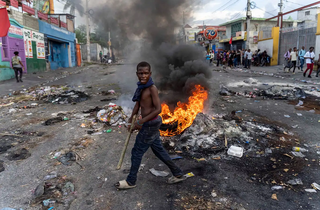This surge in violence comes amidst a broader political and humanitarian crisis gripping the country.
Gunmen targeted homes in Laboule and Thomassin before dawn, forcing residents to flee. These areas had been spared the brunt of gang violence that has plagued Port-au-Prime since late February.
The dead were reportedly shot and their bodies left on the main road and near a gas station.
These attacks raise concerns that gang violence will continue despite Prime Minister Ariel Henry's pledge to resign upon the formation of a transitional government council. The council's creation has been met with threats from gang leaders who oppose Henry and politicians joining the council.
Haiti's dire situation is further compounded by worsening food and medical shortages. The assassination of President Jovenel Moise in 2021 marked a significant escalation in the country's long-running instability.
Gang attacks on police stations, prisons, and other institutions have deepened the crisis this year. The capital's main airport has been closed, leaving residents struggling to access basic necessities.
Haiti's power company also announced that crucial substations were destroyed in the violence, leaving swaths of Port-au-Prince without electricity.
The deteriorating security situation is hindering humanitarian efforts. The UN World Food Programme is struggling to deliver aid due to limited access to the country.
The violence has also created a political stalemate, prompting the UN, US, and Canadian embassies to withdraw staff.
The international community is pushing for a Kenyan-led police force to be deployed and is hopeful that the formation of the transitional council will pave the way for elections and improved security.
The US has begun evacuating its citizens due to the limited availability of commercial flights out of Haiti. (ILKHA)



 Dünya
Dünya
 Güncel
Güncel
 Güncel
Güncel
 Güncel
Güncel
 Güncel
Güncel
 Dünya
Dünya
 Dünya
Dünya
 Güncel
Güncel
 Dünya
Dünya
 Dünya
Dünya





